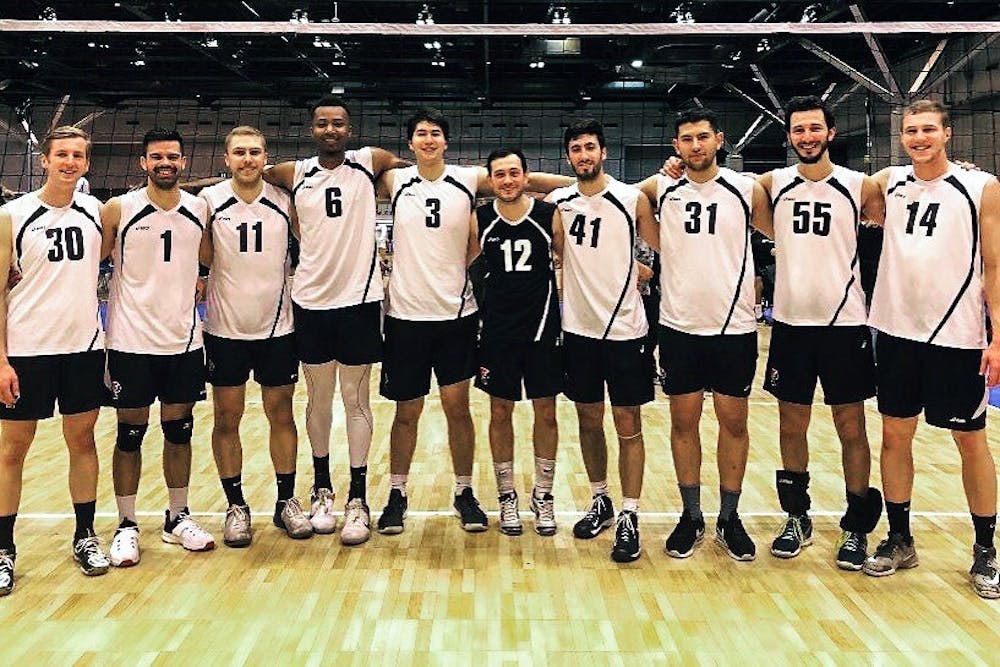
Photo From Club Volleyball
It was a Cinderella story. Not once, but twice.
Penn men’s club volleyball surged to a fifth-place finish at the National Collegiate Volleyball Federation (NCVF) Nationals last weekend, a significant result for various reasons.
The team's finish was its highest in club history. Additionally, Penn advanced further than any team in the Eastern Collegiate Volleyball Association (ECVA), which includes schools like Penn State, Maryland, and Pittsburgh.
With so few varsity men’s volleyball programs, men's club volleyball is extremely competitive. Club volleyball teams are often comprised of undergrads who were good enough to play varsity volleyball at other schools and grad students who played varsity volleyball as undergrads.
“A lot of the really big state schools don’t have men’s [volleyball] programs,” said co-captain Reno Kriz, who is a PhD student in computer science. “That is why the club programs are much stronger than they normally would be, because there isn’t a varsity team.”
The NCVF Nationals tournament, hosted in St. Louis, consisted of 48 club-level volleyball teams from around the country. But through some wild circumstances, Penn nearly did not even make it to the national tournament to begin with.
The Quakers first needed a wildcard just to go to the ECVA regional championship. Once at the regional championship, they finished third after losing to the eventual champion, Florida.
Next, the club forgot to get the necessary paperwork signed for the team to play. Luckily, the papers were signed just in time so the team would not have to go without some of its top players.
But that wasn’t all.
Before arriving at the event, the Quakers were ready to compete in the 1AA bracket, the division they had competed in previously at the NCVF Nationals. But this year, the Red and Blue landed in St. Louis to find that they had been moved up a division to 1A.
“We thought it might have been a mistake,” said co-captain Adrian Rivera, who is a PhD candidate in cellular-molecular biology.
To get to the gold bracket, Penn would have to first get through pool play.
The Quakers were matched up with Marquette, Missouri and UNLV in their pool to start the tournament. They defeated UNLV in the first match in three sets and then took down Missouri in three sets. In the final match, which would determine the winner of the pool and an automatic berth in the gold bracket, the Quakers fell to Marquette in two sets.
By not winning their pool, the Red and Blue had to go to the “challenge round.” In their next game against California State University-Chico, the Quakers were victorious in a hard-fought and close three-set match.
The win landed the Quakers in one of eight championship pools with Illinois and San Diego State. Penn won its first match against Illinois before dropping its next match to the eventual national champion, San Diege State, in two sets. Although the Quakers lost the second game, their second-place finish in the pool earned them a spot in the gold bracket.
Their reward for their accomplishment was a date with perennial powerhouse University of Wisconsin-Oshkosh, a six time national champion and winners of three-straight titles from 2014-2016.
However, the crowd and experience were in the Red and Blue’s favor.
“It was surreal because everyone was cheering for us, and they really wanted us [to beat Oshkosh],” Rivera said. “We’re an older team, and that’s what helped us.”
The Quakers took a close first set 25-23 before dropping yet another close set 22-25, before ultimately prevailing 15-12 in the third set and upsetting UW-Oshkosh. The win put the Red and Blue into the Elite Eight for the first time and in the most unlikely fashion.
“That was our best match of the whole year,” Kriz said emphatically.
“We knew that as soon as it went into the third set we knew we were going to win,” Rivera said. “Most of us have been playing volleyball for far longer than these other [teams]. So even though they might beat us in athleticism and they don’t get as tired as we do, we have the mental stamina to stay in the game.”
The Quakers hoped to continue their Cinderella story in the next round but lost to Cal Poly in two sets.
Although their glass slipper had finally been broken, the impact of the tournament and the team’s run was not lost on the players.
“It was completely surreal, thinking about it and seeing the evolution of the team and the club,” Rivera reflected.
Rivera, along with outside hitter Matteo Sordello and Kriz, were all named to the All-Tournament team.
“We’ve had our ups and downs like every other team,” Kriz said. “Getting to know all the guys on this team, I probably wouldn’t have hung out with any undergrads if I wasn’t playing volleyball, it would have just been me hanging out with the other people in my lab. So meeting a bunch of new people who also like volleyball is pretty cool.”
Rivera echoed similar sentiments.
“This was my last year on the team and I realized that this would be the last time that I would ever play competitive volleyball,” Rivera said. “Going from a not so great team with great guys to a great team with great guys, and going home with a plaque that says I made the all-tournament team, I was like ‘well these 20 years of playing volleyball were worth it’ and I am glad this is how it ended.”
It truly was a storybook ending for the Red and Blue.
The Daily Pennsylvanian is an independent, student-run newspaper. Please consider making a donation to support the coverage that shapes the University. Your generosity ensures a future of strong journalism at Penn.
Donate




